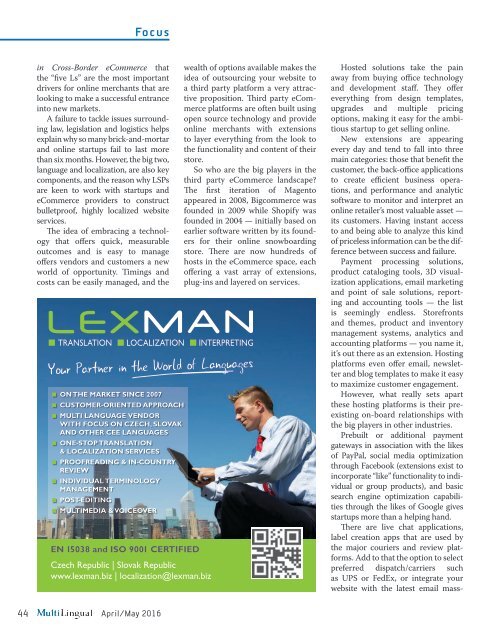Localization
z99kl79
z99kl79
Create successful ePaper yourself
Turn your PDF publications into a flip-book with our unique Google optimized e-Paper software.
Focus<br />
in Cross-Border eCommerce that<br />
the “five Ls” are the most important<br />
drivers for online merchants that are<br />
looking to make a successful entrance<br />
into new markets.<br />
A failure to tackle issues surrounding<br />
law, legislation and logistics helps<br />
explain why so many brick-and-mortar<br />
and online startups fail to last more<br />
than six months. However, the big two,<br />
language and localization, are also key<br />
components, and the reason why LSPs<br />
are keen to work with startups and<br />
eCommerce providers to construct<br />
bulletproof, highly localized website<br />
services.<br />
The idea of embracing a technology<br />
that offers quick, measurable<br />
outcomes and is easy to manage<br />
offers vendors and customers a new<br />
world of opportunity. Timings and<br />
costs can be easily managed, and the<br />
ON THE MARKET SINCE 2007<br />
CUSTOMER-ORIENTED APPROACH<br />
MULTI LANGUAGE VENDOR<br />
WITH FOCUS ON CZECH, SLOVAK<br />
AND OTHER CEE LANGUAGES<br />
ONE-STOP TRANSLATION<br />
& LOCALIZATION SERVICES<br />
PROOFREADING & IN-COUNTRY<br />
REVIEW<br />
INDIVIDUAL TERMINOLOGY<br />
MANAGEMENT<br />
POST-EDITING<br />
MULTIMEDIA & VOICEOVER<br />
EN 15038 and ISO 9001 CERTIFIED<br />
Hosted solutions take the pain<br />
away from buying office technology<br />
and development staff. They offer<br />
everything from design templates,<br />
upgrades and multiple pricing<br />
options, making it easy for the ambitious<br />
startup to get selling online.<br />
New extensions are appearing<br />
every day and tend to fall into three<br />
main categories: those that benefit the<br />
customer, the back-office applications<br />
to create efficient business operations,<br />
and performance and analytic<br />
software to monitor and interpret an<br />
online retailer’s most valuable asset —<br />
its customers. Having instant access<br />
to and being able to analyze this kind<br />
of priceless information can be the difference<br />
between success and failure.<br />
Payment processing solutions,<br />
product cataloging tools, 3D visualization<br />
applications, email marketing<br />
and point of sale solutions, reporting<br />
and accounting tools — the list<br />
is seemingly endless. Storefronts<br />
and themes, product and inventory<br />
management systems, analytics and<br />
accounting platforms — you name it,<br />
it’s out there as an extension. Hosting<br />
platforms even offer email, newsletter<br />
and blog templates to make it easy<br />
to maximize customer engagement.<br />
However, what really sets apart<br />
these hosting platforms is their preexisting<br />
on-board relationships with<br />
the big players in other industries.<br />
Prebuilt or additional payment<br />
gateways in association with the likes<br />
of PayPal, social media optimization<br />
through Facebook (extensions exist to<br />
incorporate “like” functionality to individual<br />
or group products), and basic<br />
search engine optimization capabilities<br />
through the likes of Google gives<br />
startups more than a helping hand.<br />
There are live chat applications,<br />
label creation apps that are used by<br />
the major couriers and review platforms.<br />
Add to that the option to select<br />
preferred dispatch/carriers such<br />
as UPS or FedEx, or integrate your<br />
website with the latest email mass-<br />
Czech Republic | Slovak Republic<br />
www.lexman.biz | localization@lexman.biz<br />
wealth of options available makes the<br />
idea of outsourcing your website to<br />
a third party platform a very attractive<br />
proposition. Third party eCommerce<br />
platforms are often built using<br />
open source technology and provide<br />
online merchants with extensions<br />
to layer everything from the look to<br />
the functionality and content of their<br />
store.<br />
So who are the big players in the<br />
third party eCommerce landscape?<br />
The first iteration of Magento<br />
appeared in 2008, Bigcommerce was<br />
founded in 2009 while Shopify was<br />
founded in 2004 — initially based on<br />
earlier software written by its founders<br />
for their online snowboarding<br />
store. There are now hundreds of<br />
hosts in the eCommerce space, each<br />
offering a vast array of extensions,<br />
plug-ins and layered on services.<br />
44 April/May 2016


